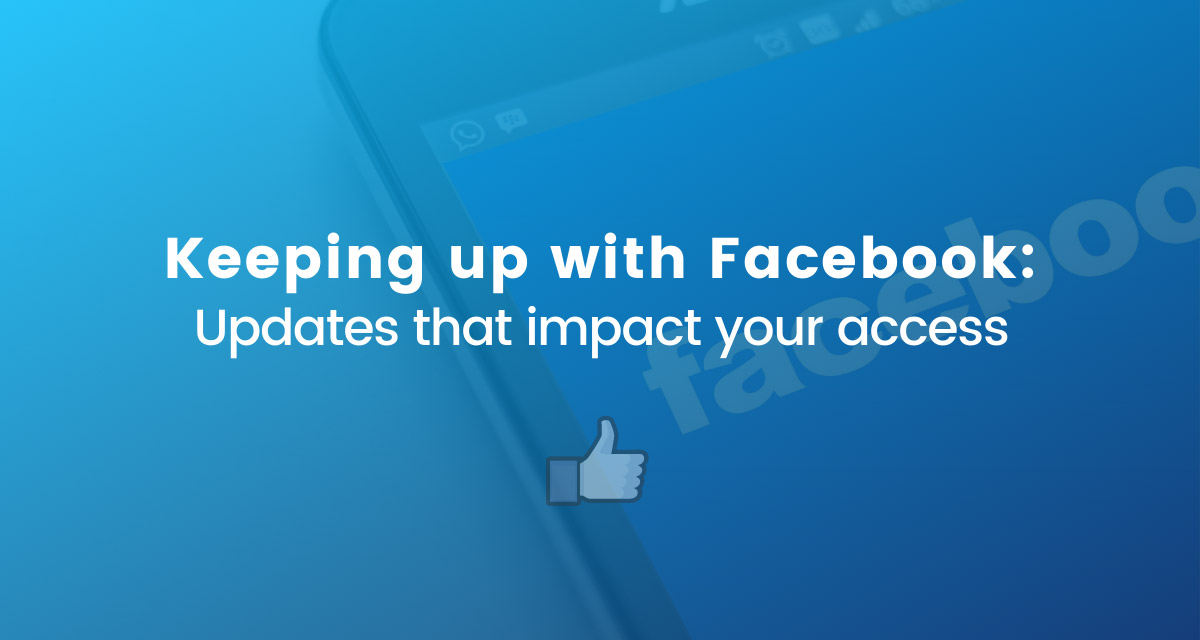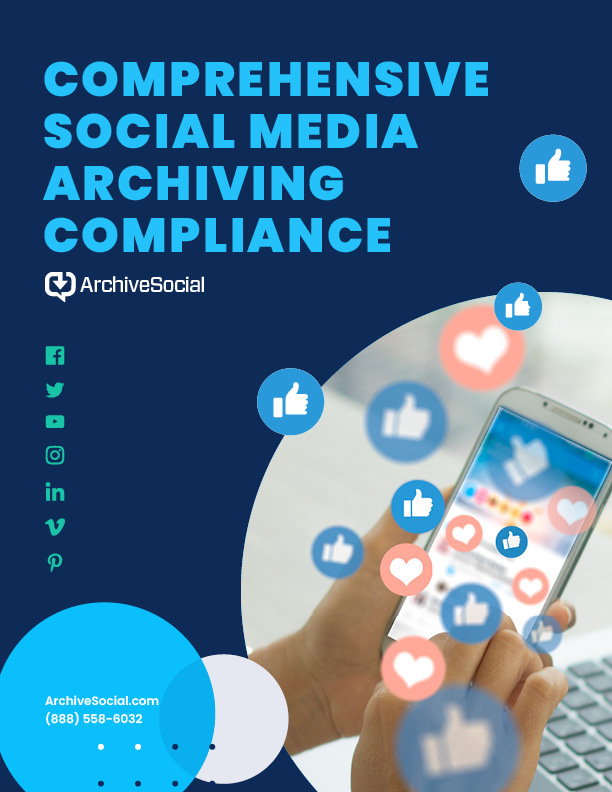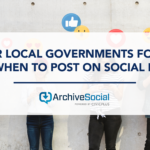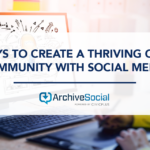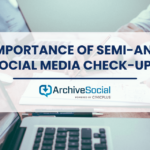In our most recent webinar, “Keeping up with Facebook: Updates that impact your compliance & access”, Alix Bowman, Director of Customer Experience and social media network thought-leader here at ArchiveSocial discussed the risks of fake accounts on Facebook and the importance of authenticity. We covered how to remain in compliance and be protected under Facebook’s new updates, and how to get actual support from Facebook.
Facebook vs. Fakebook
Facebook’s Community Standards underline their commitment to integrity and authenticity. “People are more likely to act badly online when they can hide behind a fake name,” said Bowman. Facebook wants to know who’s posting to their platform, and there are rules you have to follow if you want to keep using it. “They take misrepresentation very seriously,” added Bowman.
Two things that are prohibited on Facebook include dummy accounts and direct logins. Bowman explained, “Dummy accounts are pages you create when you represent yourself as a fake user.” She continued, “Direct logins are actually something that Facebook created, but deprecated years ago, but some people are still using them and need to stop.”
It all comes down to the fact that when you’re using Facebook, in order to be held accountable, you have to be representing a real person or a real agency, and not hiding behind a fake profile. To put this in perspective, Bowman shared that, “In the first three months of 2020 alone, Facebook has taken down 1.7B fake accounts.”
Bowman confirmed that this is something she sees all of the time in her daily work with public agencies. “Dummy profiles put your access at risk,” said Bowman. She shared terms of service examples directly from Facebook Help. “The most common reasons your page may be taken down or have limits placed on it is that they discovered that even one admin on your page is a fake profile.”
She continued, “Even if you have five people administering your page, and four of them are real, if you still have a dummy profile that’s an admin on that page, Facebook can use that as an excuse to shut you out from your own page.” It’s not just what you’re doing, but what everyone in your agency is doing. Bowman shared best practices in terms of do’s and don’ts:
- Don’t: share logins, use grey accounts, or assume you’ll get away with it
- Do: use your real profile, Facebook Business Manager, and have multiple admins.
Bowman explained that using dummy profiles also puts your agency’s reputation at risk. “A shared login means there is zero accountability.” She went on to provide examples of common situations that happen when you use one shared login for multiple people to have access to an account:
- Someone can post wrong information
- Someone can share confidential information
- Someone might respond unprofessionally to a citizens comment
- Someone might reply to a citizens comment with incorrect information
“When you log in to look at it, you don’t know who to hold accountable for that misinformation,” said Bowman. But the worst scenario that can happen, she explained, is “when someone leaves your agency who is sharing that login. They can change that information and suddenly everybody else is logged out.”
Grey Accounts Need to be Replaced
Grey accounts, also known as a direct login or business account, were actually introduced by Facebook in 2015 as a way for businesses and agencies to create a page directly without having a personal profile. Then, shortly after in June of 2015, Facebook announced that these accounts were no longer supported.
While depreciation was slow at first, access to these accounts are now actually being broken down, and third-party apps used to connect these pages are no longer supported. “Apps you have been using may be disconnected, and content posted from those apps are no longer available,” confirmed Bowman.
If they are still active, “Someone may still be authenticating into your platform using a grey user login,” said Bowman. She continued, “Or Facebook may have migrated to Business Manager on your behalf, but the grey user ID may still be actively used.”
“If you’re having trouble with things like posting videos to your page or getting locked out, there’s a good chance a grey account is at fault,” said Bowman.
If you are still using them, you need to migrate your grey accounts to Business Manager or stop using it altogether. Bowman emphasized, “No fault of yours if you had this set-up, but it is your responsibility to get rid of it and start using Facebook in the modern fashion which means using a profile to manage your page.”
The Accountability Advantage
So what should you do? Bowman answered, “Be yourself and be accountable.”
Business Manager
A general recommendation is setting-up Facebook Business Manager. “If you’re using ads on Facebook, you’re already using Business Manager, but you may not recognize all the features,” said Bowman. She went on to highlight the benefits of Business Manager:
- Internal accountability (visibility into who posted what)
- Easy to manage multiple pages
- Increased access control
- Avoid the “Oh $&#!” moment of losing access to your page (build redundancy into your page management so there’s more than one person capable of making changes)
Bowman addressed the concerns of FOIA, and stated that this is an issue she has not seen and it’s not something to worry over. She asked the audience: “Would you use a fake name to issue a press release, or use a fake name when making an official statement?” The same logic applies here, “If the answer is no, then why are you using a fake profile to post to your Facebook pages?” she affirmed.
What you see vs. the public
While this is not without risk, Bowman addressed the fear that drives the desire to create dummy profiles: people running into trouble for what they are posting to their private accounts or accidentally posting on their public page. To mitigate this risk and fear, Bowman addressed what you’re seeing versus what the public sees.
If you’re posting from a desktop and using Business Manager and your real profile as someone who has rights to the page, when you post, you will see your name. However, what the public sees is just the post with the date, it doesn’t show who posted it. “Just because you can see it doesn’t mean the public can,” clarified Bowman. She noted, “Pages don’t show admin names, but groups do.”
Posting on your Page
Bowman went on to discuss the mechanics of posting on your page:
- On desktop, you naturally post on your page as your organization. (You have to make an effort to post from your personal account)
- On mobile, it naturally posts from your profile. (You have to remember to switch over to your company page)
Bowman recommended, “If you’re regularly using Facebook as a representative of your public agency, use the Pages App.” She continued, “it’s better to deal with the clunkiness of the Pages app to have that protection of knowing your posting to your agency page as an admin and not from your profile.”
In summary, using the Pages App (get it for iOS or Android) over the Facebook app on mobile prevents posting from your profile, and helps balance your mental health. Remember, you can always use the “view as” function on Facebook to understand what exactly others can see on your profile.
Get Verified
Another way to help with authenticity is getting verified. “You can’t get your page verified if there’s a dummy profile as an admin on your page,” reminded Bowman.
If you want to increase your authenticity and trust, make the effort to get your page verified. Verifying your account helps with:
- Authenticity
- Eliminating confusion
- Building credibility
- Visibility (having you show up higher in search results)
How to Get Help
Dummy profiles are not worth the risk. There are ways to protect your personal side of Facebook while still maintaining accountability, authenticity, and compliancy to not get your page shut down. To reiterate, “Is it worth losing your primary communication on social media?,” asked Bowman.
If you’re already locked out, or want to ensure that doesn’t happen, the general Facebook Help isn’t going to get you answers.
If you are working with a public agency (which includes education and public schools) you have specific support available to your agency that is more effective than going through Facebook’s general help. To get access to this dedicated support, there are two-steps you have to follow:
- Join this Facebook group: “Government, Politics, and Advocacy” Help Group
- You have to join it with a profile (if you’re still using a grey account, create a real personal profile and join the group with that)
- You have to join it with a profile (if you’re still using a grey account, create a real personal profile and join the group with that)
- You will have a much faster response time than if you go through the general Facebook help
Interested in more Facebook Resources to eliminate risk? Check out these helpful resources:
Learn more about Facebook archiving & compliance laws,
and your public record responsibilities!
Let’s talk!

